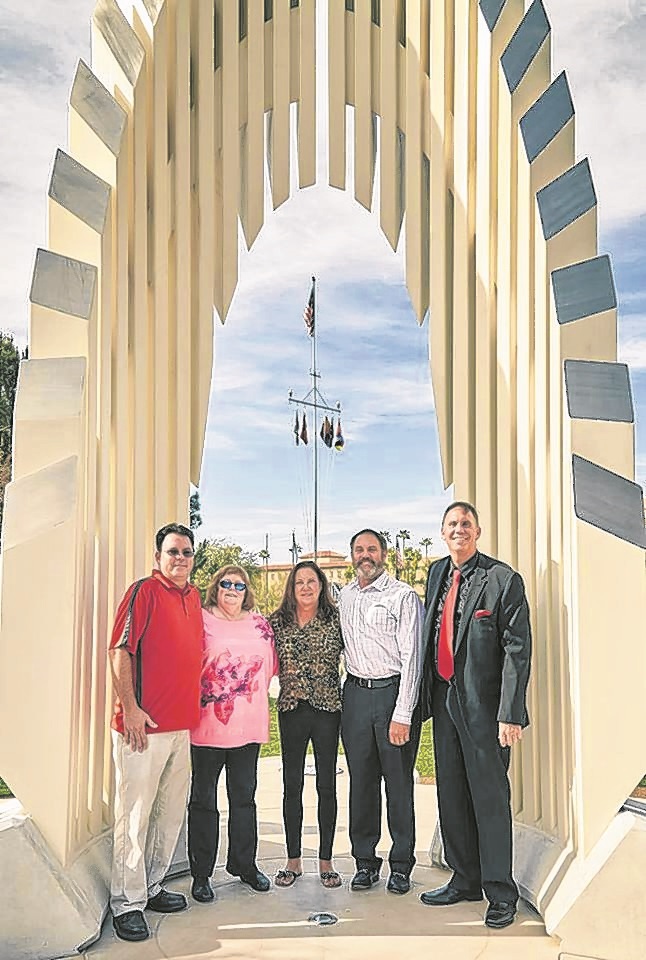
By Joyce Coronel
John D. Lewis was seven when his grandfather taught him a lesson about honesty that he’s never forgotten.
The two were in a hospital waiting room when Lewis, now a West Chandler resident, said he shook a newspaper rack and hit the jackpot: A large pile of quarters rattled out.
“I scooped them up and went to show my grandfather the great find that I got out of that newspaper machine. And my grandad said, ‘Let me see those.’”
Lewis followed his grandfather back to the machine and watched as the older man—an elder statesman and distinguished judge—fed all the quarters back into it, clicking to make sure they landed in the coin box.
“He didn’t say a word…didn’t scold me, didn’t do anything, just ‘that was what we do.’ And that was it,” Lewis recalled.
Decades later, those who visit a new memorial to Lewis’ grandfather at the Arizona State Capitol are able to get to know a bit of Ernest McFarland, a senior statesman who rose from humble beginnings and who is considered one of the fathers of the Serviceman’s Readjustment Act, later known as the GI bill.
Wednesday, June 22, marks the 72nd anniversary of the signing of the historic legislation.
A farmer and educator who later became an attorney, McFarland came to Arizona with $10 in his pocket after a bout with a bronchial infection that ended his naval career.
He saw how returning veterans of WWI came home to rampant unemployment, with former soldiers standing in long unemployment and soup-kitchen lines.
McFarland eventually rose to a career in Arizona politics, serving as a U.S. senator from 1941 to 1953 and later as governor. That job was followed by what was perhaps the most influential role of all: chief justice of the Arizona Supreme Court.
Although Lewis remembers him mainly as Grandpa, McFarland took on what became a lifelong role as mentor, emphasizing education and insisting on always “doing do the right thing” and obeying the law .
As a senator, McFarland sought to avoid a repeat of an infamous incident at Anacostia Flats, when 43,000 marchers comprising WW I veterans and families converged on Washington, D.C., to demand cash-payment redemption of their service certificates that had been awarded in 1924.
Most of the vets had been unemployed since returning after service.
The June 1932 gathering led to a clash with police, and two veterans were shot and killed in the confrontation.
In terms of his role in history, McFarland drafted the portions of the GI Bill that gave veterans access to education through tuition assistance, zero-down-payment home loans and low-interest business loans.
The resulting bill allowed millions of WWII veterans to come back to a land of opportunity, where higher education, home ownership and business loans were not just entitlements for the privileged but realistic goals for the common man.
McFarland, who passed away in 1984, also is remembered for his role with the Arizona Television Company and his subsequent opening of KTVK, the state’s third television station, shortly after he became governor in 1955.
To commemorate McFarland’s contributions to his home state, a group of Arizona leaders financed the construction of a monument to celebrate his memory. The years took their toll, however, and the monument fell into disrepair until Lewis and other McFarland grandchildren raised money to pay for a new one, with no taxpayer funding involved.
That memorial, located at Wesley Bolin Plaza, features a 24-foot triumphal arch meant to symbolize the gateway to opportunity for all Americans.
Vincent Murray, a historian with Arizona Historical Research, said the new monument relates to McFarland’s legacy as a patriot.
“The GI Bill helped millions of people achieve the American dream,” he said. “The American Dream isn’t about owning a house or a car or anything like that. It’s being able to achieve what you are capable of achieving if you are given those opportunities. That’s what the GI Bill did.”
McFarland was not in any way pretentious, Murray noted, “So we created a memorial that was inspirational and educational as well to show people that if you try hard, you make it better for yourself but you also make it better for others which is what he was doing.”
“One of the reasons my grandfather is not well known today is that he didn’t go out seeking the spotlight like so many people do today,” Lewis said.
“He would get in behind the scenes, roll up his sleeves and make a difference.”

